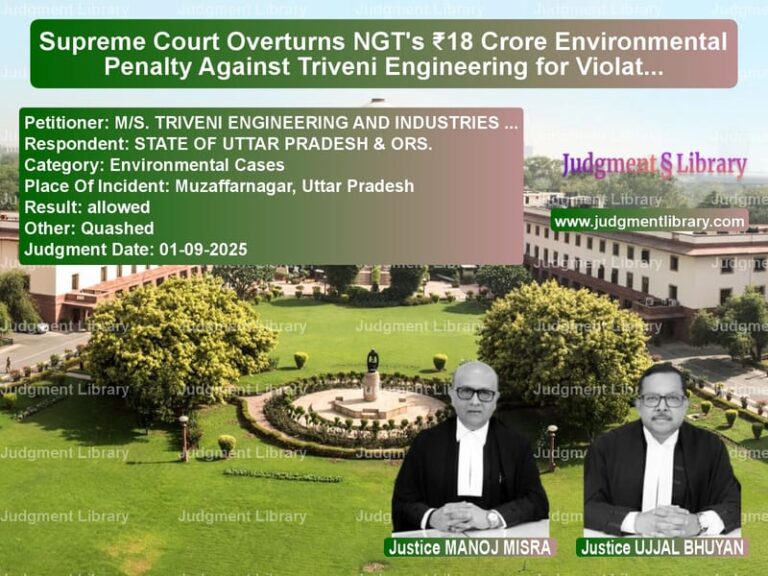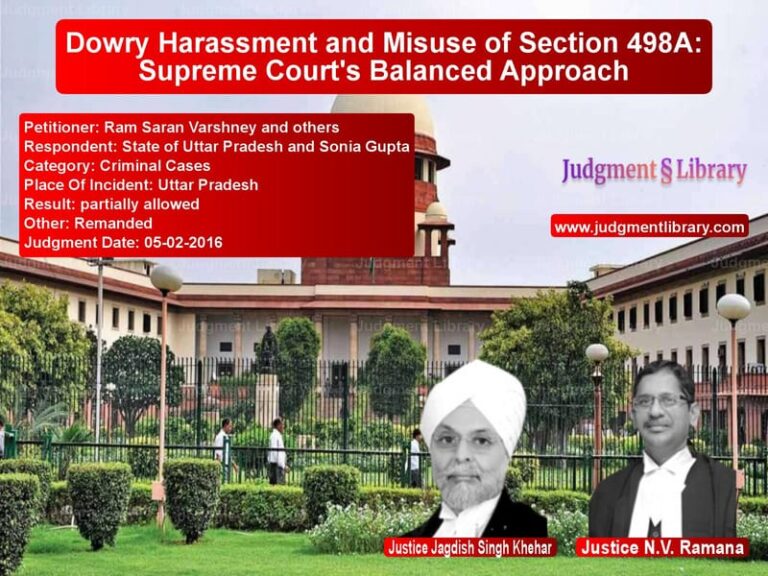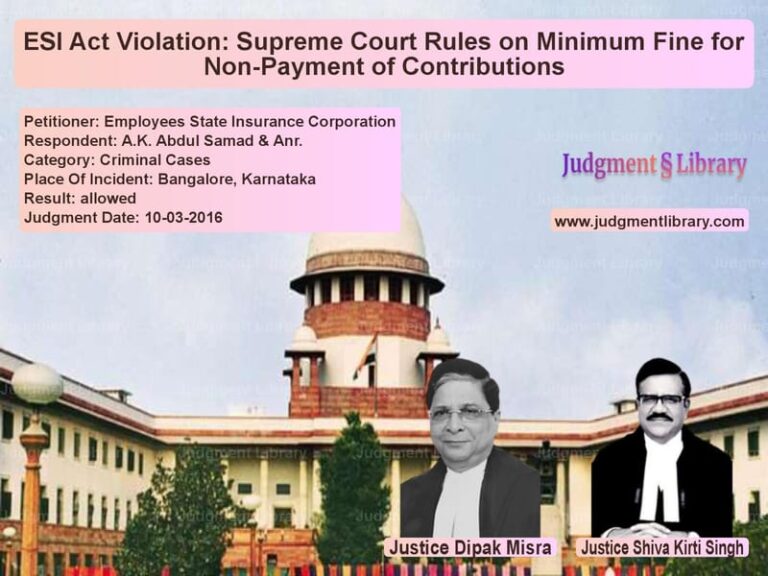Supreme Court’s Verdict on Land Ownership Dispute: Legal Implications and Analysis
The Supreme Court of India recently ruled on a significant case involving a long-standing land ownership dispute between tribal and non-tribal individuals. The case, Khora (Dead) Through Legal Heirs & Others vs. Mohar Sai & Others, revolved around a conflict concerning a property transaction that was challenged on the grounds of being a benami (proxy) transaction in violation of tribal land protection laws.
Background of the Case
The dispute traces back to a land sale executed on April 2, 1981, between Phool Chand Cherwa (a tribal individual) and the plaintiff, Mohar Sai. The defendants contended that the sale was fraudulent, as the land was allegedly purchased on behalf of a non-tribal individual, making the transaction illegal under the Chhattisgarh Land Revenue Code.
Initially, the Revenue Authorities declared the sale void, citing that it was a benami transaction in violation of Section 165 of the Chhattisgarh Land Revenue Code. The Revenue Department’s orders were upheld by appellate bodies, leading to the plaintiff challenging the verdict in civil courts.
Petitioners’ Arguments
- The petitioners (defendants) argued that the dispute had already been resolved in the revenue courts, and the civil court lacked jurisdiction to re-evaluate the matter due to the principle of res judicata.
- They contended that the sale was executed fraudulently to bypass legal restrictions on non-tribals purchasing land from tribals.
- They emphasized that the revenue authorities had confirmed that the transaction was benami and void, making further legal proceedings unnecessary.
Respondents’ Arguments
- The respondents (plaintiffs) countered that the civil court had the authority to determine whether the transaction was valid.
- They argued that as both the seller and buyer were tribals, the restrictions under the Chhattisgarh Land Revenue Code did not apply.
- The respondents also presented evidence that they had been in possession of the land for decades, constructing a house and using it for domestic purposes.
Key Observations by the Supreme Court
The Supreme Court made the following observations:
- The civil court was not bound by the findings of the revenue courts, as the revenue proceedings did not fully adjudicate the issue of actual ownership and possession.
- While revenue authorities could declare transactions invalid under the Land Revenue Code, the question of whether a sale was benami or genuine required judicial determination.
- The evidence presented showed that the plaintiff had resided on the land for an extended period, reinforcing his claim of genuine ownership.
- The Court clarified that when both parties involved in a transaction belong to the Scheduled Tribes, different legal considerations apply compared to cases involving non-tribals.
Judgment
The Supreme Court ruled in favor of the respondents (plaintiffs), affirming the decisions of the trial and appellate courts. It dismissed the appeal by the defendants and upheld the plaintiff’s right to the land. The Court emphasized that:
- The principle of res judicata did not apply, as the revenue proceedings had not conclusively resolved the civil dispute.
- The plaintiff had legally purchased the land and exercised ownership rights for several years.
- The claim that the purchase was a benami transaction for a non-tribal was not sufficiently substantiated.
Implications of the Judgment
This ruling carries important legal implications:
- It establishes that civil courts have the final authority to adjudicate land ownership disputes, even if revenue authorities have previously ruled on related matters.
- The judgment clarifies that property rights of tribals must be examined on a case-by-case basis, ensuring that unjust claims do not deprive rightful owners of their land.
- It reinforces the protection of tribal land while preventing its misuse through fraudulent transactions.
Conclusion
The Supreme Court’s decision in this case reaffirms the importance of judicial oversight in land disputes. By upholding the plaintiff’s ownership rights, the judgment ensures that legal processes are followed correctly and that arbitrary revenue decisions do not override substantive justice. This case serves as a crucial precedent in balancing the rights of tribal landowners with the need to prevent fraudulent transactions.
Petitioner Name: Khora (Dead) Through Legal Heirs & Others.Respondent Name: Mohar Sai & Others.Judgment By: Justice V. Ramasubramanian, Justice Pankaj Mithal.Place Of Incident: Chhattisgarh, India.Judgment Date: 20-02-2023.
Don’t miss out on the full details! Download the complete judgment in PDF format below and gain valuable insights instantly!
Download Judgment: khora-(dead)-through-vs-mohar-sai-&-others-supreme-court-of-india-judgment-dated-20-02-2023.pdf
Directly Download Judgment: Directly download this Judgment
See all petitions in Property Disputes
See all petitions in Landlord-Tenant Disputes
See all petitions in Contract Disputes
See all petitions in Specific Performance
See all petitions in Damages and Compensation
See all petitions in Judgment by V. Ramasubramanian
See all petitions in Judgment by Pankaj Mithal
See all petitions in dismissed
See all petitions in supreme court of India judgments February 2023
See all petitions in 2023 judgments
See all posts in Civil Cases Category
See all allowed petitions in Civil Cases Category
See all Dismissed petitions in Civil Cases Category
See all partially allowed petitions in Civil Cases Category







